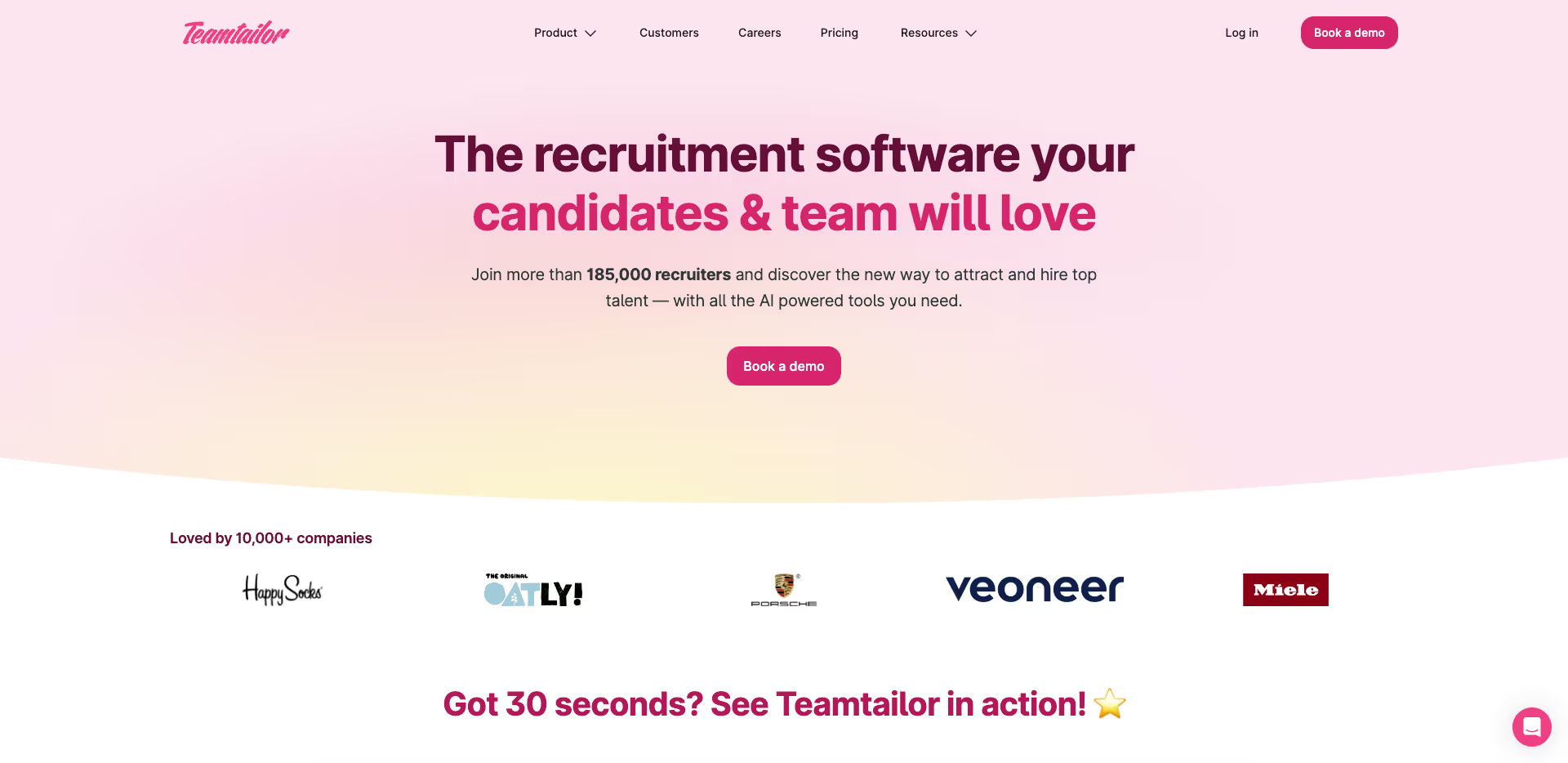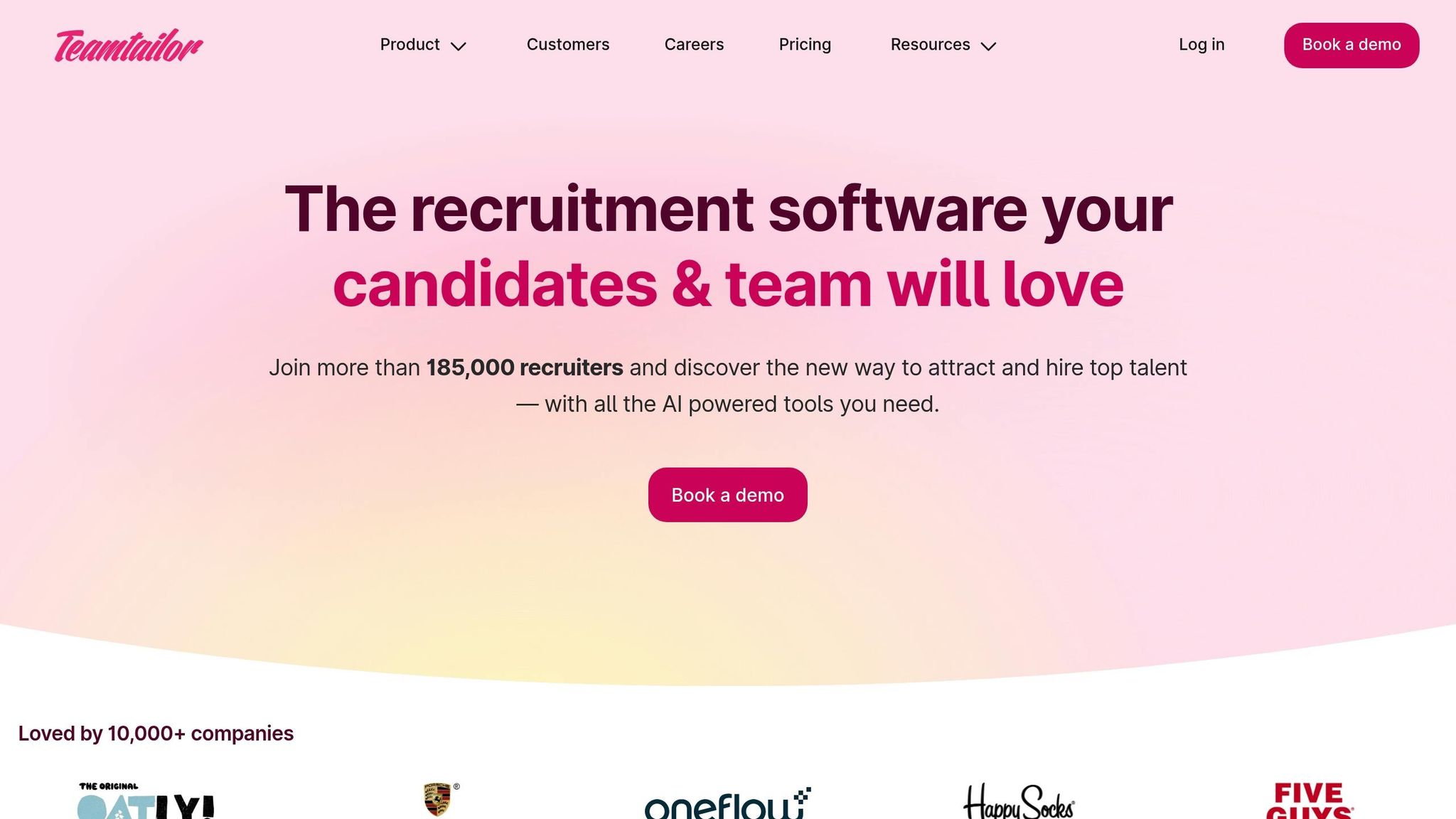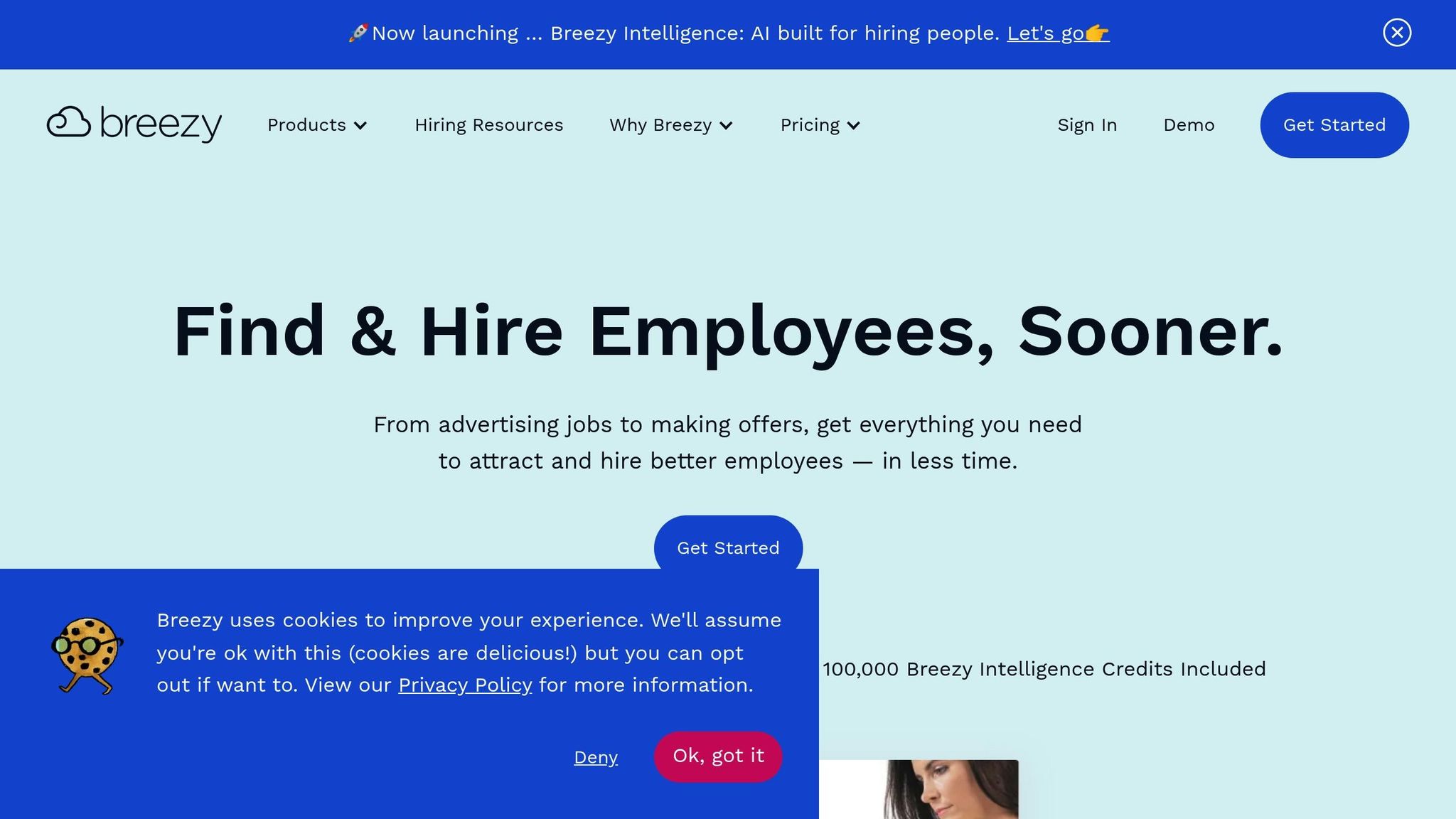Teamtailor Review 2026: A Deep Dive Into Features, Pricing, and Competitors

Teamtailor is a recruitment platform combining applicant tracking with employer branding tools. Ideal for mid-sized companies prioritizing growth, it offers features like customizable career pages, automation, and unlimited users in its base package. Its AI-powered tools simplify resume screening, job ad creation, and candidate matching, making it a strong contender in the ATS market.
Key competitors include:
- Greenhouse: Best for larger organizations needing advanced analytics and compliance tools but comes with higher costs.
- Workable: A balanced option for sourcing and assessment at competitive pricing, though less focused on branding.
- Breezy: Simple and efficient for small businesses but lacks scalability for larger teams.
- Applied: Focused on bias reduction and structured hiring, making it suitable for regulated industries.
Quick Comparison:
| Platform | Key Strengths | Main Weaknesses | Best For | Starting Price |
|---|---|---|---|---|
| Teamtailor | Employer branding, automation | Limited for enterprise workflows | Growth-focused companies | $229+/month |
| Greenhouse | Advanced analytics, integrations | High cost, complex setup | Large enterprises | $500+/month |
| Workable | Sourcing tools, affordability | Limited customization | SMBs | $149+/month |
| Breezy | Easy-to-use, visual pipelines | Not for large teams | Small businesses | $157+/month |
| Applied | Bias reduction, structured hiring | Rigid processes, basic branding | Regulated industries | Custom pricing |
If your goal is to enhance your hiring process while building a strong employer brand, Teamtailor is worth considering. However, for compliance-heavy needs or simplicity, alternatives like Greenhouse or Breezy might be better options.
TeamTailor Review: Features, Pricing, and UI Walkthrough

1. Greenhouse

When comparing Teamtailor and Greenhouse, it's clear that these platforms cater to different recruitment needs. Greenhouse is designed for organizations with complex hiring processes, while Teamtailor emphasizes a seamless ATS experience, blending applicant tracking with tools to enhance employer branding. Here's a closer look at how they stack up.
Features and Functionality
Greenhouse offers a structured and methodical approach to hiring. It includes tools like interview scheduling, candidate scorecards, and detailed reporting to support consistent workflows, especially useful for larger teams managing complex hiring processes.
Teamtailor, however, leans heavily into employer branding. Its standout feature is a drag-and-drop career site builder, making it easy for marketing teams to design and customize career pages without needing technical expertise. Both platforms incorporate AI: Greenhouse uses it to refine candidate matching and streamline interviews, while Teamtailor focuses on automating content creation and communication with candidates.
Pricing and Scalability
Greenhouse operates on a per-user pricing model, which scales as you add more users and features. Teamtailor, by contrast, includes unlimited users in its base package, making it a cost-effective choice for growing teams. For organizations that require advanced compliance and governance tools, Greenhouse may be the better fit. On the other hand, Teamtailor often appeals to mid-sized companies looking for a scalable, branding-focused solution.
Target Audience and Use Cases
Greenhouse is tailored to larger organizations that need to prioritize compliance and structured hiring. Teamtailor, in contrast, is ideal for growth-stage companies that want to focus on creating engaging career experiences and boosting their employer brand. This fundamental difference shapes how each platform influences recruitment efficiency and the overall perception of an organization’s brand.
Support and User Experience
Greenhouse offers extensive support, but its broad feature set can feel overwhelming for smaller teams, requiring more time to master. Teamtailor, with its intuitive design and user-friendly workflows, enables teams to start recruiting effectively with minimal training. While Teamtailor is known for responsive customer support, teams needing advanced, in-depth assistance might find Greenhouse better suited to their needs.
Ultimately, the decision comes down to whether your organization values a feature-packed, compliance-driven platform or a scalable solution that prioritizes branding and ease of use. Next, we’ll explore how Teamtailor compares to Workable.
2. Workable

Workable presents itself as a hiring platform built to serve a wide range of organizations, from startups to well-established companies across industries like healthcare, hospitality, and manufacturing. Unlike Teamtailor, which emphasizes employer branding, Workable leans into a more traditional applicant tracking system (ATS) approach, prioritizing strong sourcing and assessment tools.
Features and Functionality
Workable stands out for its candidate sourcing and assessment capabilities. The platform includes tools like multi-board job posting, advanced resume parsing, and customizable workflows tailored to businesses with intricate hiring needs. It’s also designed to support international teams, making it easier to coordinate hiring efforts across multiple regions and time zones. This emphasis on sourcing and assessment contrasts with Teamtailor’s focus on employer branding.
"Workable is intuitive and time-saving, with strong features like multi-board posting, resume parsing, and customizable workflows." - Katerina K., Senior HR Generalist [2]
While Workable streamlines hiring processes with automation and workflow management, its AI-powered CV screening may require manual review. On the other hand, Teamtailor offers tools that enhance employer branding and candidate engagement, catering to a different set of priorities.
Target Audience and Use Cases
Workable is a solid choice for larger organizations in industries where compliance and structured hiring processes are key. These companies often require a high level of control over their hiring processes, along with advanced tools for candidate evaluation and team collaboration. In contrast, Teamtailor appeals to businesses that want to align recruitment with their marketing strategy, focusing on employer branding to attract the right talent.
"Workable has greatly streamlined our hiring process, making collaboration across (international) teams effortless and providing a secure, centralised platform for tracking candidates." - Gaëlle B., Chief of Staff [2]
Support and User Experience
Users of Workable appreciate its user-friendly interface and the time-saving nature of its features. However, some have pointed out limitations in its reporting capabilities and flexibility for talent pooling or CRM-style outreach.
"Reporting is limited unless paired with BI tools and lacks flexibility for talent pooling, CRM outreach, and region-specific custom workflows." - Jack R., Talent Acquisition Assistant [2]
On the other hand, Teamtailor earns praise for its visually appealing and intuitive design. As one reviewer noted:
"The opportunity to include team stories and videos in the job ad also attracted a new level of candidate, which fits our ideal applicants to a tee." - Software Advice [3]
These differences highlight the distinct approaches of each platform. Organizations must decide whether they value comprehensive hiring process management or integrating recruitment with employer branding. Up next, we’ll see how Teamtailor compares to Breezy, another modern ATS solution.
3. Breezy

Breezy stands out as a modern, easy-to-use applicant tracking system (ATS) tailored for small to medium-sized businesses. Its main appeal lies in simplifying the hiring process through automation and user-friendly tools, making it a go-to choice for companies that want effective recruiting features without unnecessary complications.
Features and Functionality
Breezy shines with its drag-and-drop pipeline management and automation tools. Recruiters can effortlessly move candidates through customizable stages using a visual interface, while automated workflows handle repetitive tasks like sending follow-up emails and scheduling interviews. This not only saves time but also keeps the hiring process organized.
The platform includes other helpful features like video interviewing, candidate scorecards, team collaboration tools, resume parsing, and bulk actions for managing multiple candidates efficiently. That said, its career page customization options are somewhat limited compared to what Teamtailor offers.
When it comes to reporting, Breezy provides basic insights into metrics like time-to-fill and source effectiveness. However, it doesn’t dive deep into recruitment marketing analytics, which may be a drawback for businesses looking for more detailed data.
Pricing and Scalability
Breezy offers a straightforward pricing model, which is a contrast to Teamtailor’s custom quote system. It provides clear monthly pricing for small teams, with higher tiers adding advanced features like custom integrations and improved reporting. This transparent approach aligns well with its focus on operational simplicity. However, for larger teams, the cost - calculated per user - can add up quickly, making it potentially pricier than Teamtailor’s enterprise-oriented plans.
Target Audience and Use Cases
Breezy is ideal for small to medium-sized businesses that value efficiency. It’s particularly suited for industries like tech startups, professional services, and retail, where positions often need to be filled quickly and without the need for extensive customization. Its streamlined approach makes it a strong fit for companies looking to speed up their hiring processes without sacrificing essential tools.
Support and User Experience
Users often praise Breezy for its clean, intuitive interface and quick setup process. It enables teams to get their hiring pipelines up and running in no time. Customer support is available via live chat and email, though it doesn’t include dedicated customer success management like Teamtailor’s enterprise plans.
The overall experience with Breezy focuses on simplicity and speed. Hiring managers can easily review candidates and provide feedback without having to navigate overly complicated menus. However, this simplicity also means it may lack some of the advanced customization options that larger organizations might require.
Ultimately, the choice between Breezy and Teamtailor often depends on priorities - Breezy excels in operational efficiency and quick implementation, while Teamtailor offers a more comprehensive solution for employer branding and candidate experience. Up next, we’ll take a closer look at how Applied sets itself apart in the ATS market.
sbb-itb-88a7fe6
4. Applied

Applied takes a different approach to recruitment by emphasizing structured hiring and reducing bias, rather than focusing on employer branding. While Teamtailor leans heavily on creating a standout candidate experience and building a strong employer brand, Applied zeroes in on fair, evidence-based hiring processes to help organizations make better-informed decisions.
Features and Functionality
The standout feature of Applied is its structured interview framework combined with anonymous screening. By concealing candidate names, photos, and educational backgrounds during the initial review, Applied ensures recruiters focus solely on skills and qualifications. This methodical system contrasts with Teamtailor's more flexible workflows, offering a more standardized approach to hiring.
Another feature is Applied's detailed, weighted interview scorecards, which support data-driven decision-making. However, its career page customization is basic and functional, lacking the multimedia content and storytelling tools that Teamtailor provides for branding.
Applied's analytics dashboard is tailored to monitor diversity metrics and hiring bias indicators, setting it apart from Teamtailor's marketing-focused analytics. These features make Applied a compelling option for organizations prioritizing fairness and evidence-based recruitment.
Pricing and Scalability
Applied operates on a per-hire pricing model, making it well-suited for organizations with lower hiring volumes. However, this approach may not be ideal for companies with high-volume recruitment needs. The platform primarily targets mid-market and enterprise clients, with pricing structured around higher upfront commitments compared to Teamtailor's more adaptable plans.
Target Audience and Use Cases
Applied is particularly well-suited for large corporations, government agencies, and industries with strict regulatory requirements, such as healthcare, finance, and the public sector. Its structured hiring process aligns with compliance needs and appeals to organizations focused on reducing bias in recruitment.
For diversity-driven hiring teams and companies actively addressing bias, Applied's systematic approach is a strong fit. However, startups, creative agencies, and fast-growing tech companies may find its rigid structure less accommodating, often favoring Teamtailor's flexibility and branding tools.
Support and User Experience
Applied goes beyond standard ATS support by offering specialized training on structured interviewing. These expert-led sessions help teams implement evidence-based recruitment strategies effectively.
The platform's interface prioritizes functionality over aesthetics, resulting in a utilitarian user experience. Compared to Teamtailor's sleek and modern design, Applied may feel less polished. Additionally, its onboarding process requires more time and effort to fully adopt its structured hiring methodology.
Strengths and Weaknesses
When choosing an applicant tracking system (ATS), it’s important to weigh the advantages and limitations of each platform. This helps organizations make smarter decisions about their recruitment technology. While each ATS has its strengths, they also come with challenges that might affect how well they fit different business needs.
Teamtailor shines in employer branding and candidate engagement, offering tools like customizable career pages and multimedia support. Its sleek, modern interface is a hit with tech-savvy teams, and automation simplifies repetitive tasks. On the downside, it struggles with handling enterprise-level workflows, lacks advanced reporting tools, and its pricing increases as teams grow, which might deter budget-focused businesses.
Greenhouse is known for its powerful analytics and enterprise-ready features, offering detailed insights into hiring performance and supporting complex approval workflows. Its large integration ecosystem makes it a favorite for teams with advanced tech setups. However, its complex setup process and higher costs can be a barrier for smaller teams without dedicated IT support.
Workable delivers great value with a feature-rich platform at competitive prices. It balances functionality with ease of use, making it accessible for teams of all sizes. That said, it doesn’t offer much in the way of advanced customization, which could be a drawback for businesses with unique branding needs or intricate hiring processes.
Breezy is loved for its simple, user-friendly design that requires little training. Features like visual pipeline management and team collaboration are ideal for small to medium-sized businesses. However, it falls short when it comes to scalability and advanced capabilities, making it less effective for fast-growing companies or those with complex hiring needs.
Applied stands out for its focus on bias reduction and structured hiring, offering tools tailored for organizations committed to diversity and evidence-based recruitment. Its structured approach works well for industries with strict regulations and larger corporations. On the flip side, its rigid processes can feel restrictive for fast-moving startups, and its branding capabilities might not meet the expectations of marketing-driven teams.
Here’s a quick comparison to help visualize these insights:
| Platform | Key Strengths | Main Weaknesses | Best For | Starting Price Range |
|---|---|---|---|---|
| Teamtailor | Employer branding, modern UI, automation | Enterprise workflows, pricing scaling | Startups, growth companies | $229+/month |
| Greenhouse | Analytics, enterprise features, integrations | Setup complexity, cost | Large enterprises, data-driven teams | $500+/month |
| Workable | Value for money, balanced features | Limited customization | SMBs, budget-conscious teams | $149+/month |
| Breezy | Ease of use, visual pipeline | Scalability limitations | Small teams, simple workflows | $157+/month |
| Applied | Bias reduction, structured hiring | Rigid processes, basic branding | Regulated industries, large corps | Custom pricing |
Final Thoughts
After taking a closer look at Teamtailor and its main competitors, it’s clear this platform has its strengths and limitations. Ultimately, the right choice will come down to your company’s size, hiring needs, and overall priorities.
As of 2025, Teamtailor is used by over 8,500 companies and more than 125,000 recruiters worldwide, showcasing its widespread appeal and utility[1]. Its standout feature? The unlimited users and job postings model, which makes it a compelling option for fast-growing teams that need flexibility without worrying about user caps. With ongoing updates and flexible pricing options, it’s worth examining how it stacks up against other platforms.
Teamtailor shines with its modern interface, automation tools, and recent integrations like requisition planning, onboarding, and e-signatures. These features are particularly useful for tech-savvy hiring teams looking to streamline their processes and attract top talent[4]. For businesses focused on building a strong employer brand with a customizable and visually appealing careers page, Teamtailor delivers on its promises.
That said, it’s not for everyone. Small businesses with tight budgets might find the starting price of $229/month a bit steep. Similarly, large enterprises with complex compliance needs or highly specialized workflows may feel the platform doesn’t fully meet their expectations[4][5]. However, pricing can be negotiated for multi-year contracts or larger deals, and the unlimited user model can make the cost more palatable for growing teams[6].
Teamtailor is especially well-suited for mid-sized companies with 50–400 employees that prioritize growth, employer branding, and creating a seamless candidate experience[4][5]. If you’re curious, the 14-day free trial is an easy way to see if it fits your hiring workflows[1]. And don’t forget to compare it with alternatives like Greenhouse for enterprise-level features, Workable for affordability, or Breezy for simplicity to ensure you’re making the best choice for your needs.
Ready to see how Teamtailor measures up? Start your 14-day free trial today and explore its potential alongside other leading ATS platforms.
FAQs
What are the main advantages of using Teamtailor for mid-sized companies focused on growth and employer branding?
Teamtailor brings a range of benefits to mid-sized companies that are looking to expand and strengthen their employer branding. With its employer branding tools, businesses can design eye-catching career pages effortlessly - no design skills required. These polished pages help attract high-quality candidates, making a strong first impression.
The platform also features an intuitive applicant tracking system (ATS) that takes the hassle out of managing pipelines and keeps the hiring process organized. On top of that, Teamtailor’s automation features and AI-driven tools handle tasks like candidate communication and crafting job ads, saving time while enhancing the overall candidate experience.
For companies focused on growth, these tools make scaling recruitment efforts smoother without compromising the professionalism of their employer brand. Teamtailor offers a smart solution for blending efficient hiring practices with standout branding.
How does Teamtailor's pricing compare to competitors, and why is it a good choice for growing teams?
Teamtailor’s pricing begins at $229 per month (around $2,750 annually) and can go up to approximately $17,000 per year for mid-sized teams. When compared to alternatives like Greenhouse and Workable, which often come with custom or higher pricing, Teamtailor stands out as a more accessible option, particularly for startups and businesses in their growth phase.
What sets Teamtailor apart is its scalable pricing structure, tailored to fit the size of your company. It offers modern ATS features such as automation, employer branding tools, and a strong focus on candidate experience - all at a cost that avoids the hefty price tags found with enterprise-level platforms. This makes it a smart choice for teams aiming to grow while enhancing their hiring and branding efforts.
What challenges might larger enterprises face when using Teamtailor for complex compliance needs?
Teamtailor can pose some hurdles for larger enterprises, especially those dealing with complex compliance demands. Its analytics and reporting tools, while useful, may fall short when it comes to meeting the stringent requirements of highly regulated industries. On top of that, some users feel that its customization options and workflow features aren't quite equipped to handle the intricate processes typical of large-scale organizations. This could impact its overall efficiency in such settings.
Related Blog Posts
Read also
Ready to get started?
If you want to dive into the details just Book a Free Consultation with our staff and we’ll be happy to answer your questions.





